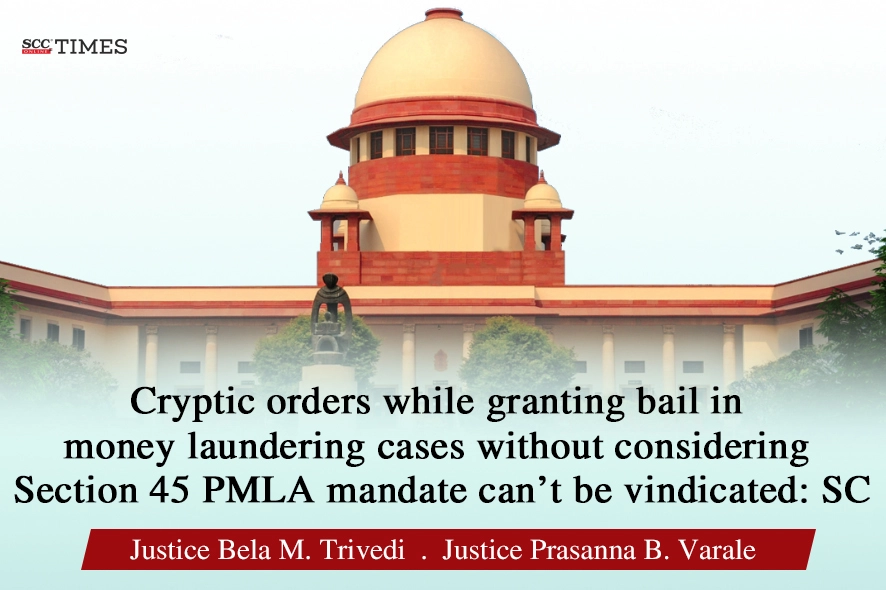Supreme Court: While considering the instant appeal challenging the legality of Patna High Court’s decision of releasing the respondent, who was accused of money laundering, on bail; the Division Bench of Bela M. Trivedi* and Prasanna B. Varale, JJ., took note of the cavalier manner in which the High Court granted bail to the respondent without considering the mandatory rigours of Section 45 of the PMLA, and emphasised that the offence of money laundering has been regarded as an aggravated form of crime world over and the offenders involved in the activity connected with the Proceeds of Crime are treated as a separate class from ordinary criminals. Any casual or cursory approach by the Courts while considering the bail application of the offender involved in the offence of money laundering and granting him bail by passing cryptic orders without considering the seriousness of the crime and without considering the rigours of Section 45, cannot be vindicated.
Background and Contentions:
20 FIRs were registered at the various Police Stations at Patna, Saran and Bhojpur Districts under Sections 38, 120B, 378, 379, 406, 409, 411, 420, 467, 468 and 471 of IPC, and under Section 39(3) of the Bihar Mineral, (Concession, Prevention of Illegal Mining, Transportation & Storage) Rule, 2019. It was alleged inter Broad Son Commodities Private Ltd. and its Directors were engaged in illegal mining and selling of sand without using the departmental pre-paid transportation E-challan, issued by the Mining Authority Bihar, and thus had caused revenue loss of Rs.161,15,61,164 to the Government Exchequer. Since the said FIRs contained Scheduled offences as defined under Section 2(1)(y) of the Prevention of Money Laundering Act, 2002 (PMLA), an ECIR came to be registered, and the investigation for the offences of Money Laundering was initiated.
It was alleged by the Enforcement Directorate (ED) that the respondent failed to appear upon being issued summons after investigation and enquiry. Furthermore, the respondent had allegedly layered and laundered the proceeds of crime generated by his father, being a syndicate member involved in illegal sale of sand using hawala network. The respondent also had allegedly concealed the proceeds of crime by way of purchasing properties, carrying out renovation work and constructions in the family owned trust property using the said proceeds of crime.
Therefore, ED filed Prosecution Complaint against the respondent and other accused for the offences under Section 3 read with Section 4 of the PMLA. The concerned PMLA Court had taken cognizance of the alleged offences on 10-11-2023.
The respondent knocked the doors of the Patna High Court seeking regular bail, which was allowed by the Court via the impugned order.
Counsel for the appellant contended that the High Court had thoroughly misinterpreted and misread the ratio of the judgments particularly of the judgment of the three-judge bench in Vijay Madanlal Choudhary v. Union of India, 2022 SCC OnLine SC 929, while holding that the provisions of Article 20(3) of the Constitution shall prevail upon Section 50 of the PMLA. Relying upon the Prosecution Complaint and other material on record, the appellant submitted that there was a prima-facie case made out against the respondent, and the offence under the PMLA being very serious and grave, High Court had committed an error in granting bail to the respondent without considering the rigours of Section 45.
Per contra, the respondent argued that the case against the respondent was made out by the appellant on the basis of inadmissible statements recorded under Section 50 of the PMLA, and that the respondent having already been released on bail by the High Court considering the material placed on record, should not be interfered with.
Court’s Assessment:
Perusing the matter, the Court explained that the objective of the PMLA is to prevent money laundering which has posed a serious threat not only to the financial systems of the country but also to its integrity and sovereignty. The offence of money laundering is a very serious offence which is committed by an individual with a deliberate desire and the motive to enhance his gains, disregarding the interest of the nation and the society as a whole, and such offence by no stretch of imagination can be regarded as an offence of trivial nature.
The Court noted that the instant case revolves around Section 45 of the PMLA. It was explained that this provision starting with a non-obstante clause has an overriding effect on the general provisions of the CrPC in case of conflict between them. Section 45 imposes two conditions for the grant of bail to any person, accused of an offence punishable for a term of imprisonment of more than 3 years under Part A of the Schedule- (i) the prosecutor must be given an opportunity to oppose the application for bail; and (ii) the Court must be satisfied that there are reasonable grounds for believing that the accused person is not guilty of such offence and that he is not liable to commit any offence while on bail. These two conditions are mandatory in nature, and they need to be complied with before the accused person is released on bail.
The Court further explained that the conditions enumerated in Section 45 will have to be complied with even in respect of application for bail made under Section 439 of CrPC. Further, Section 24 provides that in case of a person charged with the offence of money-laundering under Section 3, the Authority or Court shall, unless the contrary is proved, presume that such proceeds of crime are involved in money-laundering. Therefore, the burden to proof that proceeds of crime are not involved in money laundering would lie on the person charged with the offence. The consideration of the two conditions mentioned in Section 45 is mandatory, and that while considering the bail application, the said rigours of Section 45 have to be reckoned by the court to uphold the objectives of the PMLA.
The Court pointed out that in the instant case, the High Court in a casual and cavalier manner and without considering the rigours of Section 45 granted bail to the respondent on absolutely extraneous and irrelevant considerations. There is no finding whatsoever recorded in the impugned order that there were reasonable grounds for believing that the respondent was not guilty of the alleged offence under the Act and that he was not likely to commit any offence while on bail. Non-compliance of the mandatory requirement of Section 45 has on the face of it, made the impugned order unsustainable and untenable in the eye of law.
The Court further stated that it is no more res integra that the offence of money laundering is an independent offence regarding the process or activity connected with the proceeds of crime, which had been derived or obtained as a result of criminal activity relating to or in relation to a schedule offence. Hence, involvement in any one of such process or activity connected with the Proceeds of Crime would constitute offence of money laundering. This offence otherwise has nothing to do with the criminal activity relating to a schedule offence, except the Proceeds of Crime derived or obtained as a result of that crime.
The Court pointed out that the High Court had utterly failed to consider the mandatory requirements of Section 45 and to record its satisfaction whether any reasonable ground existed for believing that the respondent was not guilty of the alleged offence, and that he was not likely to commit any offence while on bail. Merely because the prosecution complaint had been filed and the cognizance was taken by the court that itself would not be the ground or consideration to release the respondent on bail, when the mandatory requirements as contemplated in Section 45 have not been complied with.
Therefore, the Court set aside the impugned order for being unsustainable in law and remanded the matter to the High Court for fresh consideration with request placed before the Chief Justice of Patna High Court to place the matter before the Bench other than the Bench which had passed the impugned order. The Court further directed the respondent to surrender before the Special Court.
CASE DETAILS
|
Citation: Appellants : Respondents : |
Advocates who appeared in this case For Petitioner(s): For Respondent(s): |
CORAM :











